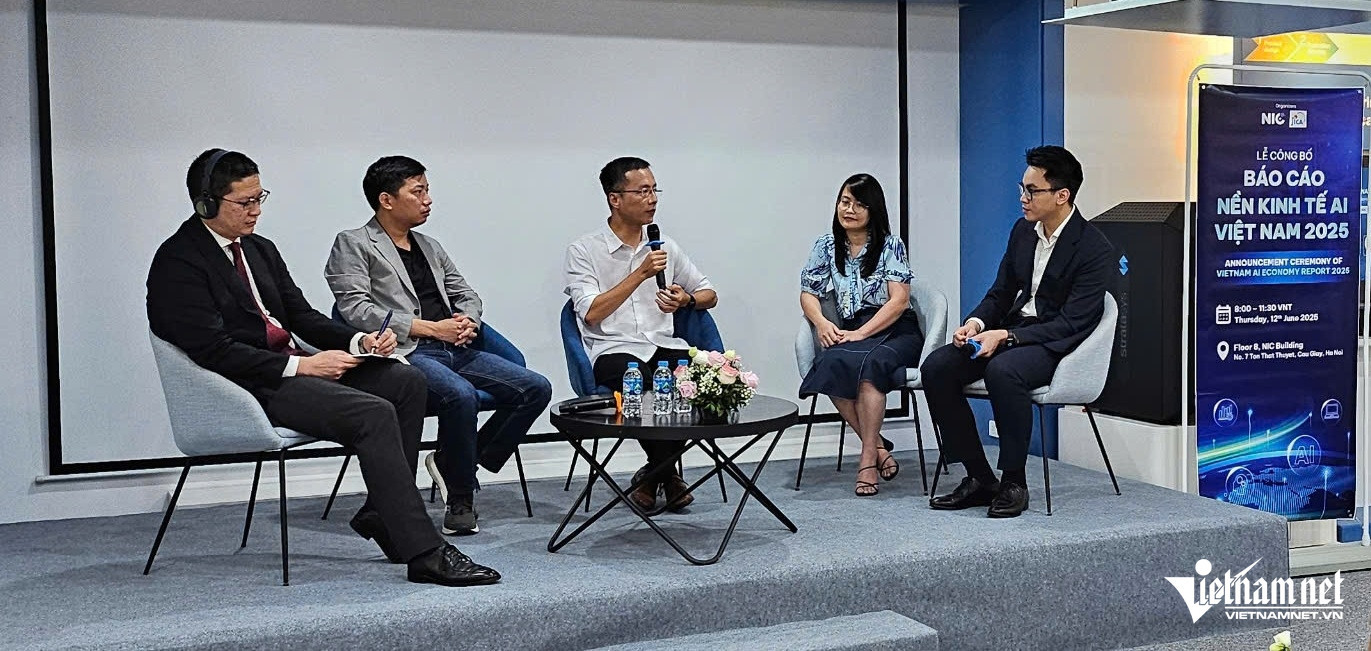To effectively leverage artificial intelligence in solving Vietnam’s complex problems, businesses cannot rely on superficial adoption or off-the-shelf solutions. Instead, they must commit to deep, customized research and technological mastery, according to Assoc. Prof. Dr. Nguyen Phi Le, Director of the International Center for AI Research at Hanoi University of Science and Technology.
She made this statement at the launch event of the Vietnam AI Economy 2025 Report, held on the morning of June 12.
While Vietnam is still in the early stages of AI development, the report highlights rapid progress and increasing participation from both government and private sectors.
Shallow AI solutions won’t solve Vietnam’s challenges

Experts from the Japan International Cooperation Agency (JICA), businesses, and academia attending the event agreed that AI’s greatest value lies in solving difficult, specific problems - from personalized e-commerce experiences to education and policymaking.
However, Dr. Le stressed that mastering the technology is more important than simply creating solutions. “Do we have Vietnamese companies that truly understand AI and can solve Vietnam-specific problems?” she asked.
She urged businesses to focus on national challenges and invest seriously in intellectual property and in-depth research, warning against a surface-level approach. “AI should change how businesses think - it's not enough to create shallow products. We need strong investment in IP,” she added.
Echoing her sentiment, Nagano Yushi, Director of JICA Xlab, emphasized that research and development (R&D) is essential when discussing AI technologies and real-world applications. He noted that Vietnam and Japan could collaborate on deep-tech innovation to accelerate Vietnam’s AI development.
Nguyen Dang Huy, CTO of Sun Asterisk, noted Vietnam’s key advantage in AI is its young, talented, and dynamic tech workforce, widely recognized by international companies.
Building a national data lake requires leadership
AI development relies on three key pillars: human resources, infrastructure, and data. While Vietnam is progressing well in talent and infrastructure, data remains a critical gap.
Nagano emphasized that data is the foundation of the AI era. A structured data-sharing framework is needed to allow stakeholders to leverage data effectively. However, Nguyen Phi Le acknowledged that building a “data lake” is challenging, particularly when companies are reluctant to share. She stressed the need for a leading institution or government body to take the initiative. “A national data lake has to be a government-led project to gain momentum,” she argued.
Nagano recommended starting with non-sensitive, non-personalized data in sectors that already have strong data infrastructure. With government leadership, he believes a collaborative data-sharing ecosystem is achievable.
Vietnam unveils 21 major challenges for science, tech, and innovation
The Ministry of Science and Technology has released a list of 21 major challenges in science, technology, innovation, and digital transformation - marking an important step in implementing Resolution 57. These national-level problems open the door to breakthroughs in science and innovation.
Nguyen Hoang Hung, CTO of Viettel AI, stated that large-scale digital transformation programs will generate valuable data, similar to how global tech giants like Google, Meta, and Naver accumulated massive datasets to power their AI systems.
He emphasized the need for leading products that attract and generate data. Additionally, he called for regulatory frameworks that balance innovation with risk mitigation - enabling businesses to operate while preventing illegal data trade and misuse.
Dr. Le also warned that many Vietnamese users are overly optimistic about AI without critical assessment, unlike more cautious approaches seen in other countries - posing potential risks.
From a policymaking perspective, Nagano advocated for a “soft” approach, similar to Japan’s model, rather than imposing rigid regulations that might stifle innovation. He suggested adapting international AI standards to Vietnam’s context to develop responsible AI guidelines. Such a framework would not only support domestic use but also help Vietnamese AI technologies expand into global markets.
Du Lam